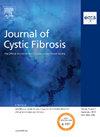WS10.04Programmed cell death 1 receptor axis blockade enhances antigen-specific T cell proliferation in paediatric cystic fibrosis
IF 6
2区 医学
Q1 RESPIRATORY SYSTEM
引用次数: 0
Abstract
Objectives
Cystic Fibrosis (CF) is associated with recurrent pulmonary infections and high morbidity. Chronic infections can produce CD4+ T lymphocyte (CD4 T cell) exhaustion, characterized by overexpression of the Programmed Cell Death 1 Receptor (PD-1). Rare studies have assessed the role of the PD-1/PD-L1 (ligand) pathway in CF-associated immune dysregulation. We investigated CD4 T cell exhaustion in a cohort of pediatric CF patients and evaluated CD4 T cell rescue after blockade of the PD-1/PD-L1 axis.
Methods
Cross-sectional monocentric study including pediatric CF patients and controls. PD-1 expression was measured on total and memory CD4 T cells by mass cytometry. Antigen-specific CD4 T cell proliferation capacity in response to CF-relevant antigens stimulation (Staphylococcus aureus (Sa), or Pseudomonas aeruginosa (Pa)), was assessed using a CFSE-based flow cytometry assay in absence/presence of anti-PD-L1 blockade antibody.
Results
We included 25 pediatric CF patients and 7 controls (56% and 86% females, median age 11 and 9 years, respectively). No significant differences were observed between the two groups in terms of 1) PD-1 expression on total and memory CD4 T cells and 2) antigen-specific CD4 T cell proliferation capacity. However, PD-1/PD-L1 blockade significantly increased bacteria-specific CD4 T cell proliferation only in CF patients for Pa (n=20, p<0.001) and Sa (n=12, p=0.02). No correlation was found between PD-1 expression on CD4 T cells, nor with antigen-specific T cell proliferative capacity, with markers of disease severity (clinico-microbiological or radiological parameters) in CF patients.
Conclusion
To our knowledge, this is the first study in pediatric CF patients showing enhanced Sa- and Pa-specific CD4 T cell proliferation after PD-1/PD-L1 blockade, despite stable PD-1 levels. Further understanding of the precise mechanism is needed, as PD-1/PD-L1 immunotherapy may represent a future therapeutic option for selected CF patients.
程序性细胞死亡1受体轴阻断可增强儿童囊性纤维化中抗原特异性T细胞的增殖
目的囊性纤维化(CF)与复发性肺部感染相关,发病率高。慢性感染可产生CD4+ T淋巴细胞(CD4 T细胞)耗竭,其特征是程序性细胞死亡1受体(PD-1)的过度表达。很少有研究评估了PD-1/PD-L1(配体)途径在cf相关免疫失调中的作用。我们研究了一组儿童CF患者的CD4 T细胞衰竭情况,并评估了PD-1/PD-L1轴阻断后CD4 T细胞的恢复情况。方法横断面单中心研究包括儿童CF患者和对照组。用细胞计数法检测总CD4 T细胞和记忆CD4 T细胞中PD-1的表达。抗原特异性CD4 T细胞增殖能力响应cf相关抗原刺激(金黄色葡萄球菌(Sa),或铜绿假单胞菌(Pa)),使用基于cfse的流式细胞术检测评估缺乏/存在抗pd - l1阻断抗体。结果我们纳入了25例儿童CF患者和7例对照组(56%和86%为女性,中位年龄分别为11岁和9岁)。两组间PD-1在总CD4 T细胞和记忆CD4 T细胞上的表达及抗原特异性CD4 T细胞增殖能力均无显著差异。然而,PD-1/PD-L1阻断仅在CF患者中显著增加了Pa (n=20, p<0.001)和Sa (n=12, p=0.02)的细菌特异性CD4 T细胞增殖。在CF患者中,CD4 T细胞上的PD-1表达、抗原特异性T细胞增殖能力与疾病严重程度标志物(临床微生物学或放射学参数)之间均未发现相关性。据我们所知,这是第一个在儿童CF患者中显示PD-1/PD-L1阻断后Sa和pa特异性CD4 T细胞增殖增强的研究,尽管PD-1水平稳定。需要进一步了解确切的机制,因为PD-1/PD-L1免疫疗法可能是未来CF患者的治疗选择。
本文章由计算机程序翻译,如有差异,请以英文原文为准。
求助全文
约1分钟内获得全文
求助全文
来源期刊

Journal of Cystic Fibrosis
医学-呼吸系统
CiteScore
10.10
自引率
13.50%
发文量
1361
审稿时长
50 days
期刊介绍:
The Journal of Cystic Fibrosis is the official journal of the European Cystic Fibrosis Society. The journal is devoted to promoting the research and treatment of cystic fibrosis. To this end the journal publishes original scientific articles, editorials, case reports, short communications and other information relevant to cystic fibrosis. The journal also publishes news and articles concerning the activities and policies of the ECFS as well as those of other societies related the ECFS.
 求助内容:
求助内容: 应助结果提醒方式:
应助结果提醒方式:


